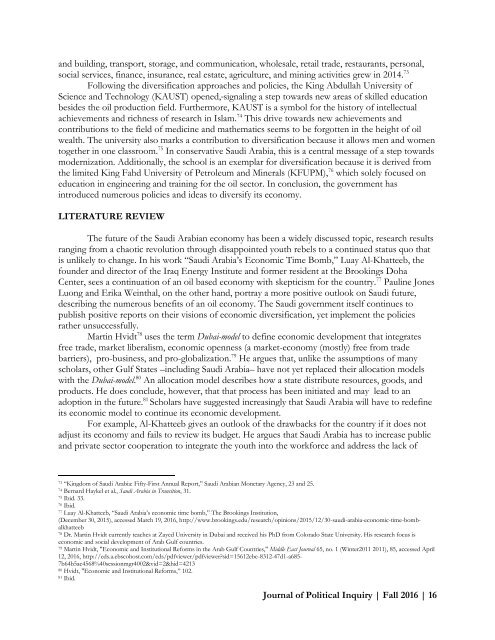Fall2016_Final
You also want an ePaper? Increase the reach of your titles
YUMPU automatically turns print PDFs into web optimized ePapers that Google loves.
and building, transport, storage, and communication, wholesale, retail trade, restaurants, personal,<br />
social services, finance, insurance, real estate, agriculture, and mining activities grew in 2014. 73<br />
Following the diversification approaches and policies, the King Abdullah University of<br />
Science and Technology (KAUST) opened, signaling a step towards new areas of skilled education<br />
besides the oil production field. Furthermore, KAUST is a symbol for the history of intellectual<br />
achievements and richness of research in Islam. 74 This drive towards new achievements and<br />
contributions to the field of medicine and mathematics seems to be forgotten in the height of oil<br />
wealth. The university also marks a contribution to diversification because it allows men and women<br />
together in one classroom. 75 In conservative Saudi Arabia, this is a central message of a step towards<br />
modernization. Additionally, the school is an exemplar for diversification because it is derived from<br />
the limited King Fahd University of Petroleum and Minerals (KFUPM), 76 which solely focused on<br />
education in engineering and training for the oil sector. In conclusion, the government has<br />
introduced numerous policies and ideas to diversify its economy.<br />
LITERATURE REVIEW<br />
The future of the Saudi Arabian economy has been a widely discussed topic, research results<br />
ranging from a chaotic revolution through disappointed youth rebels to a continued status quo that<br />
is unlikely to change. In his work “Saudi Arabia’s Economic Time Bomb,” Luay Al-Khatteeb, the<br />
founder and director of the Iraq Energy Institute and former resident at the Brookings Doha<br />
Center, sees a continuation of an oil based economy with skepticism for the country. 77 Pauline Jones<br />
Luong and Erika Weinthal, on the other hand, portray a more positive outlook on Saudi future,<br />
describing the numerous benefits of an oil economy. The Saudi government itself continues to<br />
publish positive reports on their visions of economic diversification, yet implement the policies<br />
rather unsuccessfully.<br />
Martin Hvidt 78 uses the term Dubai-model to define economic development that integrates<br />
free trade, market liberalism, economic openness (a market-economy (mostly) free from trade<br />
barriers), pro-business, and pro-globalization. 79 He argues that, unlike the assumptions of many<br />
scholars, other Gulf States –including Saudi Arabia– have not yet replaced their allocation models<br />
with the Dubai-model. 80 An allocation model describes how a state distribute resources, goods, and<br />
products. He does conclude, however, that that process has been initiated and may lead to an<br />
adoption in the future. 81 Scholars have suggested increasingly that Saudi Arabia will have to redefine<br />
its economic model to continue its economic development.<br />
For example, Al-Khatteeb gives an outlook of the drawbacks for the country if it does not<br />
adjust its economy and fails to review its budget. He argues that Saudi Arabia has to increase public<br />
and private sector cooperation to integrate the youth into the workforce and address the lack of<br />
73<br />
“Kingdom of Saudi Arabia: Fifty-First Annual Report,” Saudi Arabian Monetary Agency, 23 and 25.<br />
74<br />
Bernard Haykel et al., Saudi Arabia in Transition, 31.<br />
75<br />
Ibid. 33.<br />
76<br />
Ibid.<br />
77<br />
Luay Al-Khatteeb, “Saudi Arabia’s economic time bomb,” The Brookings Institution,<br />
(December 30, 2015), accessed March 19, 2016, http://www.brookings.edu/research/opinions/2015/12/30-saudi-arabia-economic-time-bombalkhatteeb<br />
78<br />
Dr. Martin Hvidt currently teaches at Zayed University in Dubai and received his PhD from Colorado State University. His research focus is<br />
economic and social development of Arab Gulf countries.<br />
79<br />
Martin Hvidt, "Economic and Institutional Reforms in the Arab Gulf Countries," Middle East Journal 65, no. 1 (Winter2011 2011), 85, accessed April<br />
12, 2016, http://eds.a.ebscohost.com/eds/pdfviewer/pdfviewer?sid=15612ebe-8312-47d1-a685-<br />
7b64b5ac4568%40sessionmgr4002&vid=2&hid=4213<br />
80<br />
Hvidt, "Economic and Institutional Reforms,” 102.<br />
81<br />
Ibid.<br />
Journal of Political Inquiry | Fall 2016 | 16
















